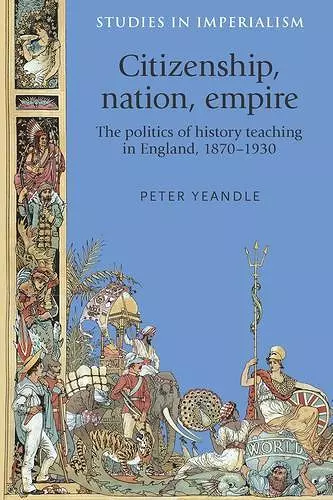Citizenship, Nation, Empire
The Politics of History Teaching in England, 1870–1930
Format:Paperback
Publisher:Manchester University Press
Published:30th Apr '20
Currently unavailable, and unfortunately no date known when it will be back

Citizenship, nation, empire investigates the extent to which popular imperialism influenced the teaching of history between 1870 and 1930. It is the first book-length study to trace the substantial impact of educational psychology on the teaching of history, probing its impact on textbooks, literacy primers and teacher-training manuals. Educationists identified ‘enlightened patriotism’ to be the core objective of historical education. This was neither tub-thumping jingoism, nor state-prescribed national-identity teaching, but rather a carefully crafted curriculum for all children which fused civic as well as imperial ambitions.
The book will be of interest to those studying or researching aspects of English domestic imperial culture, especially those concerned with questions of childhood and schooling, citizenship, educational publishing and anglo-British relations. Given that vitriolic debates about the politics of history teaching have endured into the twenty-first century, Citizenship, nation, empire is a timely study of the formative influences that shaped the history curriculum in English schools
'Peter Yeandle’s contribution on the politics of teaching history in England between 1870 and1930 does not disappoint. […] Throughout the book Yeandle has one eye on the contemporary debates on the teaching of history in schools in the twenty-first century. Indeed, the recent 800 year anniversary of the signing of the Magna Carta has generated some rather far-fetched claims about its supposed significance in the creation of Britain’s modern democracy. Yeandle’s fascinating book exposes this claim to be largely a nineteenth-century invention and shows us the value of analyzing the history text and the pedagogic debates that created them.'
The Journal of the Social History Society
'Yeandle’s study significantly extends our knowledge of how imperialism was implicated in the teaching of history before 1930. Its findings will appeal to anyone interested in the development of history as a discipline, as well as to scholars of popular imperialism and elementary education alike.'
Journal of the History of Education Society
'This is a brief and powerful work, focused on two interconnected historical problems—the politics of historical pedagogy and the inculcation of imperial culture. It is remarkably successful, and Yeandle’s solid research will engage scholars of historiography and of pedagogical bibliography long after Britain’s Michael Gove moment has passed.'
Twentieth Century British History
ISBN: 9781526149350
Dimensions: 234mm x 156mm x 12mm
Weight: 322g
224 pages